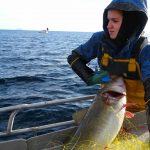The Abrolhos Islands rock lobster fishing season is well underway and commercial fishers are being urged to prepare for the risks that will arrive with the annual coral spawning.
Estimates suggest the spawning is most likely to occur between Wednesday 7 April and Saturday 10 April, but weather conditions could stretch that suggested activity window.
Department of Fisheries Abrolhos Operations Manager, Greg Finlay said the coral spawning presented risks for lobsters being stored in shallow water or lagoons.
“The biggest risk for rock lobster fishers is the de-oxygenation of the water, where the huge pinkish slicks of coral larvae occur,” Mr Finlay said.
“Fishers who have rock lobsters held in shallow water or poorly flushed lagoon areas, should take precautions by shifting their catch into deeper water during the period.”
Mr Finlay said prevailing weather conditions could impact on the spawning, so fishers should also be wary for a couple of days either side of the 7-10 April spawning period.
“The experts agree that calm weather conditions can lead to larger coral slicks, which can cause caged lobsters or fish to suffocate by taking oxygen out of the water,” he said.
“Naturally, if the conditions are rougher the spawning slicks are likely to be broken up and become more widely dispersed.
“The annual coral spawning is a vital process of renewal for the reefs we have along Western Australia’s Mid-West and Gascoyne Coasts.”
Mr Finlay said the Abrolhos Islands was a unique and significant Fish Habitat Protection Area, managed by the WA Department of Fisheries.
“There are special rules that apply to what people can and can’t do in the area and, during the rock lobster season in particular, there are also increased numbers of visitors to the islands,” he said.
“Visitors need to be aware they are not permitted to utilise infrastructure and/or live in the camps at the Abrolhos that are owned by inactive rock lobster and aquaculture licensees. This is a breach of terms and conditions that apply to the lessees of the inactive camps.”








